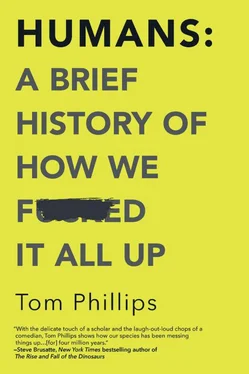Tom Phillips - Humans - A Brief History of How We F*cked It All Up
Здесь есть возможность читать онлайн «Tom Phillips - Humans - A Brief History of How We F*cked It All Up» весь текст электронной книги совершенно бесплатно (целиком полную версию без сокращений). В некоторых случаях можно слушать аудио, скачать через торрент в формате fb2 и присутствует краткое содержание. Город: Toronto, Год выпуска: 2019, ISBN: 2019, Издательство: Hanover Square Press, Жанр: История, Юмористические книги, на английском языке. Описание произведения, (предисловие) а так же отзывы посетителей доступны на портале библиотеки ЛибКат.
- Название:Humans: A Brief History of How We F*cked It All Up
- Автор:
- Издательство:Hanover Square Press
- Жанр:
- Год:2019
- Город:Toronto
- ISBN:978-1-48805-113-5
- Рейтинг книги:4 / 5. Голосов: 1
-
Избранное:Добавить в избранное
- Отзывы:
-
Ваша оценка:
- 80
- 1
- 2
- 3
- 4
- 5
Humans: A Brief History of How We F*cked It All Up: краткое содержание, описание и аннотация
Предлагаем к чтению аннотацию, описание, краткое содержание или предисловие (зависит от того, что написал сам автор книги «Humans: A Brief History of How We F*cked It All Up»). Если вы не нашли необходимую информацию о книге — напишите в комментариях, мы постараемся отыскать её.
Humans: A Brief History of How We F*cked It All Up — читать онлайн бесплатно полную книгу (весь текст) целиком
Ниже представлен текст книги, разбитый по страницам. Система сохранения места последней прочитанной страницы, позволяет с удобством читать онлайн бесплатно книгу «Humans: A Brief History of How We F*cked It All Up», без необходимости каждый раз заново искать на чём Вы остановились. Поставьте закладку, и сможете в любой момент перейти на страницу, на которой закончили чтение.
Интервал:
Закладка:
Was just really into toy soldiers. Didn’t consummate his marriage to Catherine (later “the Great,” after she deposed him) for years because he was too busy playing with them, and once had a rat court-martialed after he found it nibbling one of his toys.
Best known for the delusional belief that he was made of glass and might shatter at any moment, Charles VI of France’s sad reign ended shortly after the English tricked him into signing a treaty that declared the English monarchy heirs to the French throne—basically guaranteeing many more years of war.
5
People Power
Thanks to the capacity of autocratic rulers to make grand, operatic screw-ups on a horrifying scale, over the course of history various states have tried to mitigate this by trying out a little thing called “democracy.” With, it has to be said, varying degrees of success.
Quite where democracy was first tried out is somewhat disputed—forms of collective decision-making were almost certainly a feature of early small societies. There’s also some evidence for something at least approaching democracy in India about 2,500 years ago. But generally, it’s the Greek city-state of Athens that gets the credit for adopting and codifying democratic government at around the same time, in 508 BCE.
Of course, many of the key features of a democracy (government being open to all citizens, and elections in which citizens can replace their government if they don’t like it) do rather depend on who gets to count as a citizen. And for much of history, across many countries, that hasn’t included a few insignificant little categories of people—such as women, or poor people, or ethnic minorities. I mean, you can’t give power to just anybody , right?
Another problem with democracy is that people are generally big fans of it when they think it might give them power, but suddenly become notably less keen when it looks like it might take power away from them. As a result, democracy often involves a frankly exhausting amount of work simply to ensure it keeps on existing.
For example, Rome experimented with various cunning techniques to stop democracy sliding into autocracy. One was to split the position of consul—the most powerful elected role, which combined both civil and military leadership—between two people. They’d be elected for a year, would swap holding the most significant powers every month and were each given command of two of the four legions of the Roman army. Which is a pretty clever way to make sure that absolute power doesn’t fall into any single man’s hands.
Unfortunately, it wasn’t ideal when all four legions of the army were required for a single battle—as happened at the Battle of Cannae in 216 BCE, when Rome was faced with the assembled might of the Carthaginian forces commanded by noted elephant fan Hannibal. In that case, command of the army swapped between the two consuls, Lucius Aemilius Paullus and Gaius Terentius Varro, on a daily basis . A problem that was compounded by the fact that they didn’t agree on tactics. One day the cautious Paullus would be in charge, the next the more reckless Varro, and so on. Hannibal, who wanted to draw the Romans into battle, simply waited a day until Varro was in charge, at which point he got his wish. The result was the Roman army was virtually wiped out.
The Romans actually had a way of stopping this kind of division happening—they would appoint a “dictator,” one man who would be given absolute power in times of crisis, on the understanding that he would resign once the specific job he’d been given the power for was done. (Ironically, just before the Battle of Cannae, the Roman Senate had got rid of a dictator because they didn’t like his tactics.) Again, this was a great idea in theory, but it did rather rely on the person you’d just gifted with absolute power and the command of a vast army subsequently giving it up willingly. Which they mostly did, until an ambitious chap called Julius Caesar decided that he quite liked the power and actually he’d rather keep it, if it’s all the same to you. That ended stabbily for Caesar, but his successors also decided that absolute power was an excellent thing to have, and so the Roman Republic quickly turned into the Roman Empire.
Some of the approaches that democratic systems have taken to prevent the power-hungry from gaining undue influence over proceedings have been quite remarkable. If you get confused by, say, the electoral college system in the United States, then be thankful you didn’t live in the Republic of Venice. Several centuries before the word doge became a popular internet dog meme featuring a picture of a baffled yet placid Shiba Inu, Venice was ruled by a doge, a leader who was elected by possibly the most complicated electoral college system ever.
Given that the doge was elected for life by a Great Council of a hundred or so oligarchs—a setup with obvious potential for corruption—the electoral system was established in 1268 with the intent of preventing anybody from being able to fix the election. Here is how the Doge of Venice was elected: first 30 members of the council were chosen by randomly drawing lots. From these, lots would be drawn again, reducing the number of electors to 9. Those 9 would then elect 40 council members, who would then be whittled down to 12 by lot. Those 12 would elect 25 members, who would again be reduced by lot to 9, who would elect 45, who would be reduced by lot to 11, who would then elect 41 members—and finally, on the tenth round of the whole process, those 41 would elect the doge.
Try reading that out loud without taking a breath.
This is obviously completely ridiculous, and must have been a bloody nightmare for Venetian political pundits trying to make predictions. But in fairness to the oligarchs of Venice, it does seem to have been pretty successful (if you were a Venetian oligarch, that is) as the system stayed in place for over 500 mostly prosperous years, until the Republic of Venice was finally conquered by Napoleon Bonaparte in 1797.
Frankly that makes Venice a beacon of stability, especially when you consider that at the time of writing, Italy has, notoriously, had 66 governments and 44 prime ministerships in the 73 years of the postwar period. By contrast, the UK has had just 15 prime ministerships over the same period (in both cases, some people have held the role more than once, hence “prime ministerships” rather than “prime ministers”). That “at the time of writing” is quite important, because Italy is currently governed by a coalition of populists and far-right nationalists that doesn’t exactly scream stability. By the time it’s published, they may be on to government number 67 and prime minister 45 or possibly more. As such, in the interests of accuracy, here is that fact again, with an empty space so you can write an updated number for how many governments Italy has had:
Italy has had [ ] governments since 1946.
(Please visit howmanygovernmentshasitalyhad.comfor the current figure.)
One of the problems with democracy’s fragility is that policies that may have seemed reasonable under a nice fluffy liberal democracy can start to backfire rather horribly when a more authoritarian regime takes over. For an example, look to Mexico in the first half of the nineteenth century, when the Mexican authorities—newly independent from Spain—decided to put the underdeveloped land in their northern province of Texas to good use. Wanting a buffer zone that would protect Mexico from both raids by the Comanche people and the westward growth of the United States, the Mexicans started encouraging American ranchers and farmers to come and settle in the area, handing over large tracts of land to empresarios , agents who would encourage Americans to make the move (the fact that there was no extradition treaty may have been a big factor for some people).
Читать дальшеИнтервал:
Закладка:
Похожие книги на «Humans: A Brief History of How We F*cked It All Up»
Представляем Вашему вниманию похожие книги на «Humans: A Brief History of How We F*cked It All Up» списком для выбора. Мы отобрали схожую по названию и смыслу литературу в надежде предоставить читателям больше вариантов отыскать новые, интересные, ещё непрочитанные произведения.
Обсуждение, отзывы о книге «Humans: A Brief History of How We F*cked It All Up» и просто собственные мнения читателей. Оставьте ваши комментарии, напишите, что Вы думаете о произведении, его смысле или главных героях. Укажите что конкретно понравилось, а что нет, и почему Вы так считаете.












